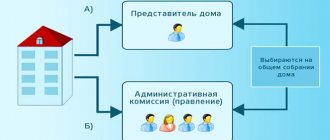What is a real estate owners' association: rights and obligations, legislation
TSN is called a real estate owners' partnership. Persons established by the charter can join it. It involves the association of persons who have the entire triad of powers for joint ownership, use and management of their real estate. This organization is abbreviated as TSN.
This cooperative has both its rights and obligations. Since this is a non-profit association, they do not have the rights to engage in profit-making activities. They can only hold general meetings, decide the agenda, and issue internal local legal acts.
This organization is obliged to respect the rights and legitimate interests of the participants of the partnership, carry out management activities, make decisions on concluding agreements with third-party organizations, etc.
This organization has the right to manage property on the basis of internal local legal acts.
The main legislative regulation is carried out by such normative legal acts as:
- Constitution of the Russian Federation.
- Housing Code of the Russian Federation.
- Civil Code of the Russian Federation, etc.
Certain provisions may be enshrined in presidential decrees and government regulations. It is possible to rename TSN to HOA. However, the work of this organization will not change.
Do they have jobs and how are they paid?
As for wages, housing cooperatives and homeowners associations have this, of course. You can receive wages in a partnership or cooperative. It will be accrued from the moment the employment contract is signed. On its basis, the employee, in accordance with internal regulations, is obliged to perform the work required by his position. The amounts of payment will be established by the members of the partnership or cooperative at the general meeting.
According to Article 65 of the Housing Code, the rights and obligations of everyone who is part of the partnership can be changed.
What do we end up with? Each owner will have to independently decide what, in his opinion, will be better - a homeowners' association or a housing construction cooperative. You shouldn’t make a hasty decision; the right thing to do first is to add up all the pros and cons of both.
But no matter what choice is made, the main aspect will still be caring owners. If the owners are directly involved in the life of the house, the house will prosper and everyone will be happy!
What is the difference between an HOA and a housing cooperative?
The abbreviations HOA and ZHSK can often be heard in connection with home maintenance. What is the difference between HOA and housing cooperative? We will figure it out in our article.
What is HOA
HOA as an acronym stands for homeowners' partnership. This is a non-profit organization that is created to manage residential premises in an apartment building.
This is one of the forms of managing common property on a par with, for example, a management company. This is a legal entity, the procedure for creating which is regulated by civil law. In order to create an HOA, you need to hold a general meeting of residents, which must be documented in writing. Otherwise, the registration authority will not approve the creation of this legal entity. faces.
The difference between a management company and an HOA is that the first is a professional commercial company, and the second is a non-profit association. She does not have the right to engage in business. She can rent out property and otherwise receive small profits and spend it only on the needs of this non-profit association.
The main differences between an HOA and a management company:
| Distinctive element | HOA | UK |
| Nature and purpose of creation | To manage common property | To make a profit |
| Controls | HOA Board | Director of the management company |
| Decision making procedure | By holding general meetings | By decision of the General Director |
| Creation time | Created, as a rule, for an indefinite period | The validity period can be provided by concluding an agreement between the owners and the management company |
What is the difference between homeowners' association and housing cooperative
The next very important difference is that members of a homeowners association (HOA) do not have the obligation to cover the resulting losses through additional contributions (which is available to members of the cooperative).
The differences that lie in the plane of property relations are essential. As a general rule, a homeowners association (HOA) is not the subject of ownership rights to the premises and common facilities of an apartment building.
The housing construction cooperative acts as the owner of both residential premises and public facilities.
Secondly, in homeowners' associations (HOA) there are no share legal relations.
In cooperatives, the funds of the mutual fund are the funds of a legal entity and have a strictly designated purpose: they are intended exclusively to pay for the construction or cost of the built house.
Members of homeowners' associations (HOA), as is clear even from the name and confirmed by civil law, are the owners of the premises, i.e. they paid for or purchased residential premises for various reasons before joining the partnership.
The house is in good hands
Next, almost everything is similar. The board is elected for a term of no more than two years. True, the charter of the partnership may stipulate that the chairman is elected not by the members of the board, but by the general meeting.
A member of the board of a homeowners' association cannot be a person with whom the association has entered into an agreement for the management of an apartment building, or a person holding a position in the management bodies of the organization with which the association has entered into the said agreement, as well as a member of the audit commission (auditor) of the association. A member of the board of a homeowners' association cannot combine his activities on the board of the partnership with work in the partnership under an employment contract, as well as entrust, trust, or otherwise entrust to another person the performance of his duties as a member of the board of the partnership.
The claim-notification also states that it is possible to resolve the issue of debt repayment in a pre-trial manner (conclude a debt repayment agreement with the management organization, providing for payment in installments for a certain period, and perform certain work to repay the debt). If the owner of the premises, after the expiration of the period specified in the notice, has not made payment, and also has not applied to the management organization to resolve this issue in a pre-trial manner, a statement of claim for debt collection is drawn up and filed with the court.
We recommend reading: This is an independent requirement
What is the difference between a homeowners' association and a housing cooperative: legal and accounting aspects
When reconciling the balance sheet, excess expenses are reflected in current assets, and if expenses are less than the money collected, they are reflected in short-term liabilities. If there is a shortage of funds in one account and an excess expense in another, the accountant must reflect it in the debit and credit balance.
The peculiarity of the account of the non-profit housing cooperative is that the initial savings for working capital are nothing more than the entrance fees of each member of the cooperative. These funds are non-refundable, even if you leave the cooperative. In addition to membership and share fees, cooperatives can resort to borrowing the required amount of funds from banks.
What is housing cooperative
Housing cooperative is understood as a housing construction cooperative. This is the official decoding of this term. The legislation established that it is not a for-profit company engaged in the joint management of consumer resources. A cooperative is created with the aim of pooling the financial resources of citizens for the construction of houses, dachas, etc. All citizens participate in this association by making a share contribution. Ownership of the building will arise only in a situation where the share is fully paid for.
Subsequently, this office can be transformed into a TSN or into a HOA. This occurs at the request of the owners by holding a general meeting and registering a new legal entity to replace the existing one.
Main features of HOA
Important! According to the law, a homeowners association (hereinafter referred to as the HOA) cannot engage in the construction of a house. The organization is created by apartment owners after the facility is put into operation and documents for ownership are completed.
One HOA can unite apartment owners of several buildings. To form an HOA, more than half of the apartment owners must join it. He is responsible for the maintenance of common areas and landscaping. Residents who purchased apartments in an already built building, or former members of the housing cooperative, can join the partnership. Decisions on significant issues are made at a general meeting. But when resolving certain issues, it is necessary to take into account the opinion of homeowners who do not want to join this organization. These questions include:
- repair and reconstruction of common areas;
- house reconstruction;
- acquisition of land plots;
- construction of buildings on the local area.
Consumer cooperative in comparison with TSN and HOA
One of the forms of association of citizens is a consumer cooperative. The purpose of creating this legal entity. persons - satisfaction of the material or everyday needs of citizens on the basis of the contributions they make.
This organization is non-profit, which means that the founders do not have profit-making goals. By and large, TSN and HOA are types of consumer cooperative.
Depending on how responsibility is distributed and what property citizens own and use, a consumer cooperative can be created in various forms. So, an example would be apartment buildings. They mainly create HOAs, which can be deciphered as a partnership of owners of residential premises.
In the case where the purpose of creating a legal entity is to own and manage land, garages, dachas, etc., it is recommended to create a TSN - a partnership of real estate owners.
How does HOA differ from TSN and from housing cooperative: which is better, pros and cons, comparison table
It was previously stated what HOA and TSN are. We can make an unambiguous conclusion that these are two varieties of one form of non-profit associations - consumer cooperatives. A housing construction cooperative differs significantly from them.
This is legal. a person whose purpose is not to own and manage common property, but to create such property, in this case, residential apartment buildings.
To clarify this issue more specifically, you can provide a comparative table and identify the pros and cons of each of these formations:
| Characteristic | Homeowners Association | Property Owners Association | Housing construction cooperative |
| Form of education | Entity | Entity | Legal face |
| Purpose of creation | Non-commercial interests | Non-commercial interests | Commercial interests |
| Activities | Ownership and management of residential premises | Ownership and management of lands and real estate | Creation of new objects of legal relations - apartment buildings |
| Investments of persons | May or may not be | May or may not be | Funds are contributed to contribute to construction |
Thus, despite the differences between these organizations provided for by law in Russia, they are in many ways similar.
Disclosure of information to HOAs and housing cooperatives
It should be noted that in 2020, the legislator paid much attention to checking the activities of organizations managing apartment buildings. This is important to ensure that the rights and legitimate interests of citizens are respected.
According to the new legislation, issues in the housing and communal services sector must be taken into account in the reporting documentation of authorized organizations. Accounting includes not only summing up financial reports, but also identifying the work carried out in the house and the contracts concluded.
Citizens who are members of one of the management organizations have every right to receive all reliable information about the activities of the HOA or housing cooperative. This is realized through access to documentation, the right to request certificates and reports on activities for a week, month, year.
In a situation where the rights of a citizen who is part of an HOA or housing cooperative are violated, he has the right to leave this legal entity, get his share back (if any was paid) and demand full compensation for losses in court or through a claim procedure. If there are a large number of complaints about this legal entity. person, it can be forcibly liquidated.
The difference between a HOA and a housing cooperative
Table No. 1 provides a comparative list that gives an answer on the topic - HOAs and housing cooperatives, what is the difference:
| Name of differences | Owners Association | Construction cooperative | Add-ons |
| Purpose of formation | General management of apartment owners property of MKD | Purchase, construction or renovation of a house | During reconstruction work, both forms of government have the right to act as developer |
| Constituent documentation | Based on the Charter | Based on the Charter | |
| Formation method | At a general meeting of property owners with subsequent recording in the minutes | Drawing up a protocol on the decision of the community founders | |
| Number of members | Minimum 50% + 1 vote of the total number of residential property owners | Minimum 5 persons, but not more than the number of housing | |
| Validity | Indefinite | Indefinite | In this case, the forms of ownership will not differ. But an additional period may be established in the Charter |
| Membership | Owners | Phys. persons aged sixteen years and older, legal companies | |
| Governing body | The meeting is headed by the chairman and together with the audit commission | Meeting, chairman, auditor | |
| Introduction of participants | The right to join a HOA occurs at the time of purchasing an apartment in a specific building | According to the application |
Additionally, these forms of house management will differ from the management company both in form of formation and in regulation by the legislative framework. In view of this, the choice of an HOA or a housing cooperative is obvious, i.e., associations initially pursue different goals.
Homeowners Association and Taxation
As a rule, these legal entities are recommended to use the simplified taxation system (STS).
Taxation is being transferred to a simplified form, in which a legal entity is exempt from paying certain mandatory contributions. Because a homeowners' association is a non-profit partnership, they do not pay most of the taxes that business associations must pay (such as corporate income tax).
This does not mean that TSN pays virtually no taxes. Civil legislation allows this organization to carry out other useful activities in addition to owning and managing common property, for example:
- Collection and acceptance of share and entrance fees from members of the organization.
- Raising money for ongoing repairs or capital construction (reconstruction) of a building.
- Other fees, including when using common property of residents for profit.
All these financial receipts must be properly declared. This is done by an accountant. Based on such declarations, the amount of tax contributions of the property owners' association will be calculated.
What happens if you register a HOA and a TSN at the same time?
The fundamental acts regulating the creation and activities of HOAs and TSNs are the Civil Code of the Russian Federation and the Housing Code of the Russian Federation. It should be noted that both laws consider HOAs as one of the varieties of TSN.
In the event that the registration authority carries out the procedure for registering an HOA in the place of an existing HOA, then one of these organizations, if this omission is identified, will be removed.
Often, even before registration, Rosreestr officials identify facts of double registration and stop it.
Thus, it was determined how the types of consumer cooperatives differ from each other, how to register them, etc. You can learn the advantages and at the same time disadvantages of each of these forms by studying in detail the norms of modern legislation.




